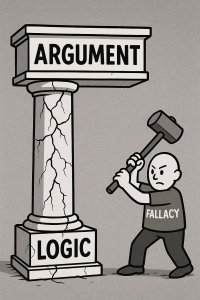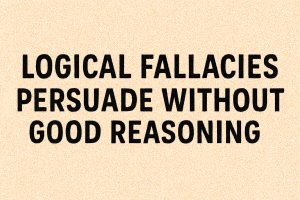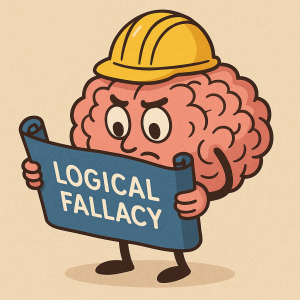Introduction to Logical Fallacies
Kainan Jarrette and Diana Daly
What is a Logical Fallacy?
 A logical fallacy is an error in reasoning that undermines the logic of an argument.
A logical fallacy is an error in reasoning that undermines the logic of an argument.
Sometimes fallacies are used as intentional deception, and other times they’re made unconsciously and without malicious intent.
Logical fallacies often feel compelling — not because they’re logically sound, but because they take advantage of cognitive biases we’ve discussed in the previous section.
Why Logical Fallacies Matter
Logical fallacies are one of the most significant factors in undermining critical thinking. They make unreasonable and irrational arguments sound reasonable and rational, which makes those arguments much easier to absorb and believe. Essentially:

Unfortunately, logical fallacies also show up everywhere. You can find them in politics, advertising, social media, personal conversations, and even academic settings.
Understanding logical fallacies helps you:
- Become more resilient to the manipulation and misinformation you’re likely to encounter throughout your life
- Become better at constructing your own arguments
What to Focus on in this Section
Each of the following chapters will focus on a specific logical fallacy. There are dozens1 of logical fallacies, but we’ll just be highlighting the most common ones you’re likely to encounter.
 As you read through the chapters, try to:
As you read through the chapters, try to:
- Make sure you understand how the fallacy works on a structural level (if you have any confusion, ask your instructor for clarification!).
- See if you can spot examples of them in your daily life.
- Notice that sometimes different logical fallacies can overlap or be used in combination with others.
What’s in a Name?
There’s a growing and concerning trend in many forms of media around weaponizing the identification of logical fallacies. Many popular media personalities are quick to use the terminology around logical fallacies, often without having a good grasp of what that fallacy means.
This in itself can be a form of manipulation and misinformation. Just because somebody says something like “that’s a straw man argument!” doesn’t mean it actually is.
The important part isn’t naming the fallacy, it’s being able to understand and explain where and how the error in reasoning is occurring.
Vocabulary
logical fallacy
an error in reasoning that undermines the logic of an argument
References
1 Wikipedia contributors. (n.d.). List of fallacies. Wikipedia. https://en.wikipedia.org/wiki/List_of_fallacies
Media Attributions
- Fallacies Undermine Pillars of Logic © ChatGPT is licensed under a CC0 (Creative Commons Zero) license
- Logical Fallacies Text 01 © ChatGPT is licensed under a CC0 (Creative Commons Zero) license
- Brain and Blueprint © ChatGPT is licensed under a CC0 (Creative Commons Zero) license
an error in reasoning that undermines the logic of an argument
the set of rules and principles we use to determine whether a conclusion correctly follows from the information or assumptions of an argument
in the context of logic, the claim that's being made, including how that claim is backed up
the systematic ways our minds can lead us to misjudge, misunderstand, or ignore information
the practice of carefully analyzing information, beliefs, and arguments in order to make well-reasoned decisions, form justified beliefs, and avoid being misled

